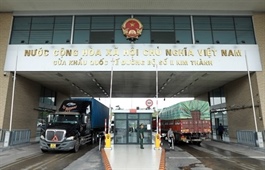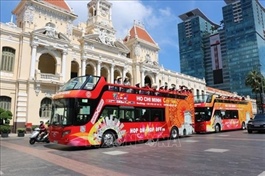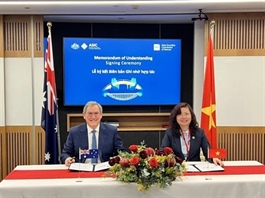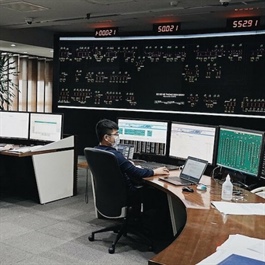Aviation industry makes efforts to meet travelling demand amid aircraft shortage
Aviation industry makes efforts to meet travelling demand amid aircraft shortage
The Civil Aviation Authority of Việt Nam (CAAV) has urged carriers to increase the hunt for aircraft rentals to meet rising travelling demand in the remaining months of this year.
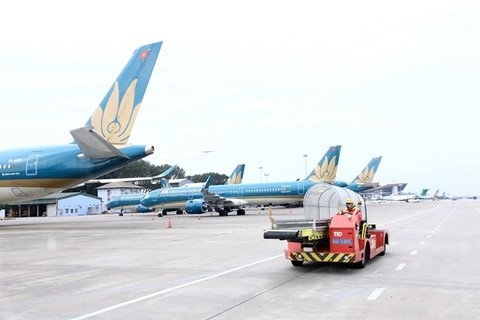
Aircraft of Vietnam Airlines on Nội Bài International Airport. The Civil Aviation Authority of Việt Nam has urged carriers to look into leasing to meet rising travelling demand in the remaining months of this year. — VNA/VNS Photo Huy Hùng |
The authority said that it would create the most favourable conditions for airlines to put rented aircraft into operation early.
Statistics showed that the total number of aircraft granted Air Operation Certificate (AOC) of domestic carriers was 195 as of the end of July, 36 lower than the same period last year. On average, around 167 aircraft are in operation, 51 lower than last year.
The shortage is caused by the global recall of engines by Pratt & Whitney for their PW1100 on Airbus A321Neo and the restructuring of Bamboo Airways and Pacific Airlines.
About 94.4 per cent of the aircraft granted AOCs were operated in 2023, but the rate has fallen to 85.6 per cent this year.
The CAAV forecast that the aviation industry would handle around 78.3 million passengers and 1.21 million tonnes of cargo in 2024, representing a rise of 7.7 per cent and 13.4 per cent, respectively, over 2023.
To meet the rising travelling demand, domestic airlines recently geared up the efforts to lease aircraft.
Bamboo Airways has rented three aircraft following wet leasing agreements to focus on increasing capacity for routes with high travelling demand during summer such as Nha Trang, Đà Nẵng and Quy Nhơn.
Bamboo Airways’ general director Lương Hoài Nam said that the carrier was striving to get planes for its domestic routes.
The carrier expected to rent one additional plane in the remaining months of this year to open new domestic routes including HCM City – Đà Lạt, HCM City – Thanh Hoá and HCM City – Phú Quốc.
The shortage of aircraft might linger on to next year, general director of Vietnam Airlines Lê Hồng Hà said.
Vietnam Airlines raised a number of solutions to cope with the shortage, including reducing flight frequencies on low-demand routes in off-peak times and increasing frequencies for high-demand.
The airline also planned to rent five more aircrafts by the end of this year.
The airline was also boosting flights with attractive ticket prices in early mornings and late evenings. Occupancy rates of the flights to tourist magnets like Hà Nội, HCM City, Đà Nẵng, Nha Trang, Đà Lạt, Quy Nhơn, and Phú Quốc that take off after 9pm and before 5am in May and June were high, reaching 75 – 94 per cent, Hà added.
For its part, Vietjet plans to receive ten additional planes between now and the end of 2024, including eight A321Neos and two E190s. It is scheduled to add more A321Neo, A330-300, E190, and Boeing 737 Max to its fleet in 2025.
Deputy Minister of Transport Lê Anh Tuấn said the aviation sector could still expect to encounter numerous difficulties along with aircraft shortages including carriers’ restructuring, route rearrangement, higher fuel costs and foreign exchange differences, which might impact airfares.
During the first half of 2024, Vietnamese airlines served nearly 37.5 million passengers, up 3.7 per cent year on year and equivalent to 96 per cent of the figure in the same period of 2019, when the aviation market was enjoying good growth. Notably, they included 20.2 million passengers on international routes, soaring 38.6 per cent year on year and equivalent to that in the first half of 2019, statistics show.
Việt Nam's aviation safety index was rated at 77.1 per cent, up 11.54 per cent from 2016 and well above the Asia-Pacific average of 65.31 per cent and the global average of 68.81 per cent, according to the Universal Safety Oversight Audit Programme of the International Civil Aviation Organisation.



